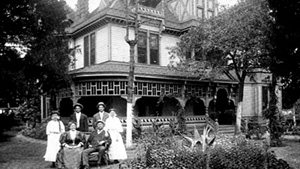From Proud Heritage, Volume I by DCPA, currently out of print.
Jacob A. Work (born 25 October 1824 Tennessee, died 23 January 1893 Dallas, Texas), a son of Julia Bishop (born 14 May 1794 Petersburg, Virginia, died 13 March 1880 Tennessee) and Fleming Work (born 12 May 1795 Tennessee, died 6 March 1870 Tennessee), was one of ten children. His siblings were William, John M., Robert C., Andrew Jackson, Thomas, Harriet, Martha, Millard, Eliza. On the 8th of May 1845 in Tennessee, Jacob and Mary Adline Richards were married. Mary (born 12 May 1826 Kingston, Tennessee, died 25 October 1891 Dallas, Texas) was an only child of Richard Richards (born 7 July 1782 Virginia, died 16 November 1849 Tennessee) and Mary Ellen Brown Ayers (born 26 September 17 85 North Carolina, died 17 September 1855 Tennessee).
With Federal troops on his heels, Jacob A. Work left a life of adventure and enterprise in Kentucky and Tennessee to come by water to Jefferson and thence overland to the Dallas area in 1869. With him were his wife and seven children.
Jake, as his friends called him, rose during the Civil War from Captain to Colonel, to which he was brevetted after leading the charge of Horseshoe Bend, battle of Chickamauga. During the charge, his horse had been shot from under him.
After the war, which had included for Jake two periods of confinement in military prisons from which he escaped and continual pursuit by Northern troops, Dallas must have seemed a paradise of peaceful industry. In Dallas Jake rented part of the Coit farm (later owned by Henry Coit) and got off to a good start. Cotton raised the first year was sold and the proceeds used to buy 100 steers which were fed the corn also grown that year. On the drive to New Orleans, the first possible market at that time, the steers got the “blackleg,” and the profit was gone.
Some progress was made. They brought back from the drive a sewing machine and a cookstove, among the first of their kind in Dallas County. Before then women cooked on open fireplaces and did the sewing by hand.
The next year Jake rented a farm from Thomas Crutchfield. It was just south of where the Lakewood Country Club was to be much later and ran up to Junius Street. In 1930 Judge Thomas A. Work, a son of Jacob Work, told of going to town with his father to have cotton ginned at Terry’s Mill on South Houston Street. The steers used to pull the wagon bolted for water at Mill Creek. Then, nearing the courthouse, they ran for the shade of the chinaberry thicket along the fence around the courthouse. The fence was destroyed, Jake had to pay the damages, and the profit from the cotton was gone.
Jake next moved to downtown Dallas with $15.50 to his name. He paid $15.00 for three months’ rent of a one-room house with a shedroom attached. It was on ground later to hold the old Medical Arts Building. With fifty cents remaining, Jake went job hunting. He was hired as foreman of the stables for Gaston and Barkeley’s Livery Stable on the southwest corner of Main and Houston Streets. Gaston, whose name looms large in Dallas history, thought so much of Jake’s work that he bought out his partner’s share for $4,500 and sold it to Jake, with payment to be made when he was able. Three years later, Jake’s holdings were valued at $75,000.
Work and Gaston were most influential in transportation in early Dallas. Work imported the first drays, hacks and floats to be used there. Gaston introduced the first mules to replace the oxen used earlier. Later, Captain Gaston bought the property for a railroad right of way for the Texas &. Pacific Railway and donated it in order to bring the train within two blocks of the courthouse. The first train, however, arrived over the Houston and Texas Central in 1872. The T &. P made it the next year. From the introduction of the railroads, Dallas began to grow and “soon developed into the wildest town of the frontier”.
When the Work family arrived the markets of Dallas stocked buffalo, bear, and antelope meat, and many of the families supplied their own by hunting. Deer and bear were to be found in and around Dallas. The contrast between the hunting society of those early years and the town of Dallas after the advent of the railroads is a dramatic one. Certainly Jacob A. Work had a vital role in such a development.
Mary and Jacob Work had ten children. They were 1) Richard Valle born 8 January 1846 Tennessee, married (1st) Susan Bradford, (2nd) Mattie Beatty; 2) William Alexander born 16 October 1847, Tennessee, married Parthenia Eliza Ellis; 3) Laura Sophia born 10 February 1850, Tennessee, died circa 1918, married J. G. Eblen; 4) Alpha Kingston Ayres born 25 March 1852, Tennessee, died 21 November, 1884, married Janie DeBoise; 5) John M. Fleming born 26 February 1854, Tennessee died 1929, married Bertie Horton; 6) Charles Augustine born 2 May 1856, Tennessee, died circa 1925, married Rappie Gale; 7) Mary Kate born 1858, died 1861, Tennessee; 8) Thomas Albert born 8 December 1860, Tennessee, died 4 November 1939 Dallas, married Lulu Ann Johnston; 9) Ida Belle born 20 January 1867, Kentucky, died circa 1900, married W. K. Rawlins; 10) Robert A. born 17 November 1869, Dallas, died 1870. Mary and Jacob Work and several of their children are buried in Greenwood Cemetery in Dallas, Texas.
By Thomas A. Harris, great grandson, Dallas


